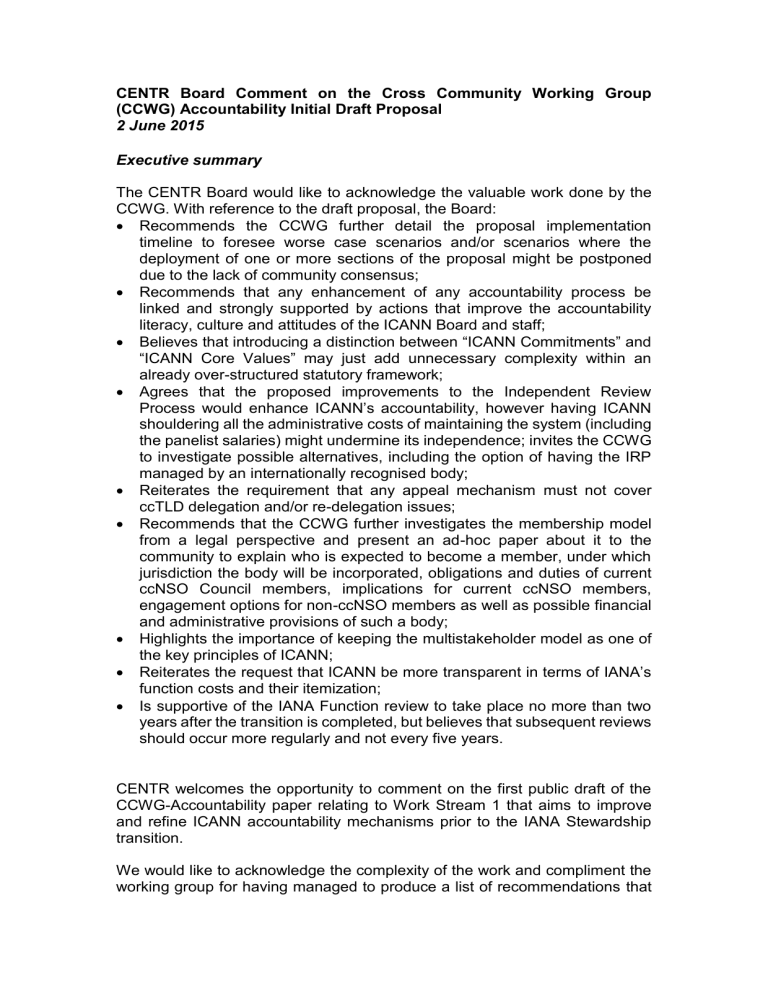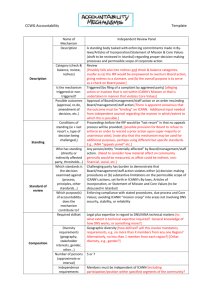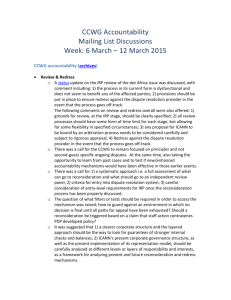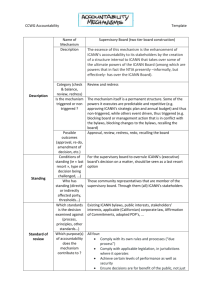CENTR - icann

CENTR Board Comment on the Cross Community Working Group
(CCWG) Accountability Initial Draft Proposal
2 June 2015
Executive summary
The CENTR Board would like to acknowledge the valuable work done by the
CCWG. With reference to the draft proposal, the Board:
Recommends the CCWG further detail the proposal implementation timeline to foresee worse case scenarios and/or scenarios where the deployment of one or more sections of the proposal might be postponed due to the lack of community consensus;
Recommends that any enhancement of any accountability process be linked and strongly supported by actions that improve the accountability literacy, culture and attitudes of the ICANN Board and staff;
Believes that introducing a distinction between “ICANN Commitments” and
“ICANN Core Values” may just add unnecessary complexity within an already over-structured statutory framework;
Agrees that the proposed improvements to the Independent Review
Process would enhance ICANN’s accountability, however having ICANN shouldering all the administrative costs of maintaining the system (including the panelist salaries) might undermine its independence; invites the CCWG to investigate possible alternatives, including the option of having the IRP managed by an internationally recognised body;
Reiterates the requirement that any appeal mechanism must not cover ccTLD delegation and/or re-delegation issues;
Recommends that the CCWG further investigates the membership model from a legal perspective and present an ad-hoc paper about it to the community to explain who is expected to become a member, under which jurisdiction the body will be incorporated, obligations and duties of current ccNSO Council members, implications for current ccNSO members, engagement options for non-ccNSO members as well as possible financial and administrative provisions of such a body;
Highlights the importance of keeping the multistakeholder model as one of the key principles of ICANN;
Reiterates the request that ICANN be more transparent in terms of IANA’s function costs and their itemization;
Is supportive of the IANA Function review to take place no more than two years after the transition is completed, but believes that subsequent reviews should occur more regularly and not every five years.
CENTR welcomes the opportunity to comment on the first public draft of the
CCWG-Accountability paper relating to Work Stream 1 that aims to improve and refine ICANN accountability mechanisms prior to the IANA Stewardship transition.
We would like to acknowledge the complexity of the work and compliment the working group for having managed to produce a list of recommendations that
represents a good first step even though they are not supported by the consensus of the working group.
The draft paper presents various recommendations for whose implementation
ICANN bylaws need to be amended. We fail to see a clear timeframe for these amendments to enter into force prior to the IANA Stewardship transition. We suggest to the CCWG that any part of the proposal is assessed from a detailed time perspective (best case and worse case time scenarios) to make sure its implementation is feasible considering the time constraints. The timeline as presented in section 10 seems to be based on best-case scenarios where the intervals between CCWG working periods, public comments and deliverables are based on tight, consequential timings that might be subject to delays. It would be valuable to understand what would happen if a section of the proposal does not move forward because of lack of consensus. Will it be withdrawn and reconsidered at a later stage?
We express our concern at seeing that most of the proposed accountability enhancements are linked to the introduction of safeguard mechanisms. While we believe this might be necessary at a certain stage, we would like to underline that any enhancement of any accountability process must be linked and strongly supported by actions that improve the accountability literacy, culture and attitudes of those who are expected being held accountable. Therefore, we warmly recommend that the entire ICANN Board, and, most of all, ICANN staff
– especially those daily involved in community engagement and operation management
– go through regular accountability training programmes as well as a by-yearly audit process - done by an independent body - of their daily modus operandi (e.g. a proper, careful and regular review of the ICANN
Documentary Information Disclosure Policy which in our opinion should occur as part of the accountability enhancements of Work Stream 1 instead of 2 as proposed by the CCWG).
Last but not least, in order to make this process as transparent and inclusive as possible, we would recommend that any future draft for public comment is always accompanied by graphics that help the broader DNS community
– generally made of time-starved executives
– to better understand the implications of certain proposals at ICANN internal and external level. As a matter of fact one measurement for the success of such a process is the extent of community engagement which, to date, has been extremely low.
Furthermore, we would recommend that any draft and/or graphics go through a proper language editing and consistency check to avoid that certain proposed mechanisms are named in a different way throughout the paper and graphics.
3) Principles
3.1 Revised Mission, Commitment & Core Values
The recommendations in the draft include revising ICANN’s Bylaws to clarify the scope of ICANN’s policy authority, reflect key elements of the Affirmation of
Commitments, and establis h a set of “Fundamental Bylaws” which can eventually be amended based on prior approval by the Community.
While we agree that ICANN’s Mission statement might require language refinement against the scope of ICANN’s policy authority, that the current
Bylaws might also be reviewed to reflect the key elements of the Affirmation of
Commitments and that the Board should have a limited ability to change the key accountability provisions, we support the list of requirements that represent the basis of the recommendation but we do not believe that these changes alone will improve accountability at ICANN Board and staff level. As a matter of fact and as stated earlier, we recommend that – once the accountability enhancements are enforced – both ICANN staff and Board go through regular training programmes to increase their accountability literacy and culture which are of paramount importance if the community likes to have the accountability spirit at the next level.
Moreover, we think that introducing a distinction between “ICANN
Commitments” and “ICANN Core Values” may just add unnecessary complexity within an already over-structured statutory framework. We would also like to point out that one of the first elements to be clarified is to make sure that any
Bylaws do not contain “competing values”, but rather “complementary values”.
3.2 Fundamental Bylaws
We believe that the introduction of socalled “Fundamental Bylaws” that should be “harder” to change than other provisions, would moderately improve
ICANN’s accountability. The entire ICANN “rulebook” should apply to all ICANN
Board members and/or staff without distinguishing among core values that would then become “frozen”.
4) Appeals Mechanisms
We agree that the proposed improvements to the Independent Review Process would enhance ICANN’s accountability, however having ICANN shouldering all the administrative costs of maintaining the system (including the panelist salaries) might undermine its independence. We invite the CCWG to investigate possible alternatives, including the option of having the IRP managed by an internationally recognized body. That might simplify the appointment procedure which in the draft CCWG paper appears to be extremely complex and, to a certain degree, incomplete.
The panelists must be as independent as possible. Furthermore, we support the notion that panelists must have international arbitration expertise, additionally, but not exclusively, in the DNS environment. We would also like to highlight the importance of having multicultural, multinational and multilingual panelists.
Concerning the recommendation that IRP decisions should be based on precedents, we do not support this principle as any decision must always be duly substantiated and based on policies that might have evolved over the years.
Last but not least we reiterate the requirement that any appeal mechanism must not cover ccTLD delegation and/or re-delegation issues.
4.2 Reconsideration Process Enhancement
We support both the broadening of the types of decisions which can be reexamined to include ICANN Board/sta ff action/inaction against ICANN’s
Mission or core values as stated in the Bylaws, and the improvement in terms of transparency regarding dismissal cases.
At the same time, and considering possible calendar constraints, we recommend the deadline for a reconsideration request be increased to 45 days.
On the other hand, final decisions should have a much shorter deadline. The
120 days deadline is too long and might imply negative collaterals on those impacted by ICANN Board/staff action/inaction. Therefore, final decisions should be issued within 90 days as ultimate deadline.
5) Community Empowerment
We highly recommend the CCWG carefully check the option of creating a formal membership body with the power to hold the ICANN Board accountable.
As a matter of fact, we understand that the SO/AC Membership Model has been scrutinised from the ICANN Bylaws perspective, but not from the perspective of those organisations/companies that are expected to become “engaged”.
Therefore, considering this is one of the most sensitive elements in the entire proposal, we invite the CCWG to further investigate the model from a legal perspective and present an ad-hoc paper about it to the community to explain
– as clearly as possible – who is expected to become a member, under which jurisdiction the body will be incorporated, obligations and duties of current ccNSO Council members, implications for current ccNSO members, engagement options for non-ccNSO members, as well as possible financial and administrative provisions of such a body. The current proposal fails to describe these crucial elements in plain and clear words.
Furthermore
, we firmly believe that sentences like “community participants would have the choice of option in and participating in this new accountability system, or to simply keep on doing what they do today in an ICANN that is more accountable than it is today” are poorly formulated and:
Introduce discrimination in processes that should be kept multistakeholder and bottom-up based;
Fail to acknowledge the existence of participants that may like to join the new model, but cannot do so because of the legal framework from which they operate.
We support the principle that the existing functions and work of the SOs and
ACs would continue being done within the framework of the ICANN Bylaws and that only the new accountability powers require use of the “unincorporated associations” mechanisms.
Concerning the powers to be assigned to the newly established membership body, we would like to point out what follows:
We support the ability of the community to reject strategic and operating plans/budgets which have already been approved by the Board if they are believed to be inconsistent with the purpose, m ission and ICANN’s role as set out in the Bylaws. To this respect, we strongly reiterate the request that
ICANN should be more transparent in terms of IANA ’s function costs and their itemisation. We believe that the community power should consist in inviting the Board to review the plans, but not in re-writing them. A better enhancement of ICANN accountability would occur if certain recommendations made unanimously by various stakeholder groups are taken on board at the time of their submission. That would avoid time consuming iterations like the Board approval of a plan and its possible, subsequent rejection by the community membership body.
We support the possibility for a new body to reject proposed Bylaw changes after their approval by the ICANN Board, but only before they come into effect. At the same time, we believe this power may slightly improve
ICANN’s accountability, but it may also impact the Bylaws amendment process and make the ICANN Board/staff in charge of it more defensive when coping with Bylaw changes. Over the past decade, we have witnessed a slow approach of ICANN staff and Board to certain Bylaws changes. The introduction of a community power even to reject Bylaws changes after their approval might push the ICANN staff (in charge of all the various preparatory, consultative, editorial and administrative steps to introduce the amendments) and the Board to delay possible change processes until there is certainty that they will not be questioned by the community at a later stage.
We believe that the power of the membership body to reject proposed Bylaw changes after their approval by the ICANN Board before they come into effect and to give positive assent to any change to the Fundamental Bylaws before completion might seriously hamper the process flow and therefore, introduce unnecessary approval layers. Accountability mechanism refinements might be better introduced at the Board representativeness level rather than via new approval layers. The fact the Board does not represent the community that elects it indicates one of the intrinsic accountability issues discernible in the current ICANN structure.
We support the introduction of mechanisms that would allow the community
– not necessarily the “membership body” – to eventually remove individual directors. We would recommend a cautious approach when expanding the role of the NomCom be followed (which should undergo a major review process to refine certain procedures, like the Board members selection and interview phases). We are against asking each Director to sign a resignation letter when accepting their appointment as it could trigger any Board member
’s accountability profile. A Board member cannot be held legally/administratively accountable with a dated and signed resignation letter because they can always say that the letter was signed and filed before the wrong action they might be held liable.
We support the introduction of mechanisms that would allow the ICANN community to eventually recall the entire ICANN Board. We believe that both this community power, the steps to implement it and the causes to
enforce this ultimate power must be extremely well designed and transparently described.
6) Incorporating the Affirmation of Commitments into the ICANN Bylaws
We agree that the incorporation of the Affirmation of Commitment principles into the ICANN Bylaws might enhance certain accountability aspects. At the same time, we believe that adding a new Bylaws section for Periodic Review of
ICANN Execution of Key Commitments will certainly serve to better assess
ICANN’s high-level performances.
Concerning the proposed IANA Function Review – IFR – we are supportive of a review to take place no more than two years after the transition is completed, but we believe that subsequent reviews should occur more regularly and not every five years.
7) Bylaw changes suggested by Stress Tests
We recommend that the proposed change to ICANN Bylaws regarding the
Board response to Governmental Advisory Committee Formal Advice be made more stringent as “will respond in a timely manner” is too vague and does not commit the Board to respond within any specific timeframe.
9) Items for Consideration in Work Stream 2
The transitional article in ICANN Bylaws to be adopted by the Board to commit
ICANN to implement the CCWG-Accountability recommendations must include a timeframe for it to happen.
We urge the CCWG to reconsider the allocation of certain items to Work Stream
2 (addressing accountability topics for which a timeline for developing solutions and full implementation might extend beyond the IANA Stewardship Transition) to Work Stream 1 as refinements to certain procedures might be able to enhance ICANN accountability in the short term, including enhancements to the Ombudsman’s role and function, the introduction of limits to ICANN’s ability to deny transparency/disclosure requests, the definition of security audits and certification requirements for ICANN’s IT system.
10) Implementation Plan Including Timing
We are concerned by the paragraph that underlines the uncertainty relating to the efforts required for Work Stream 1 implementation. Furthermore, we believe that several of the estimated timelines represent the best case scenario and invite the CCWG to present the community with a more detailed timeline under best and worst case scenarios.


